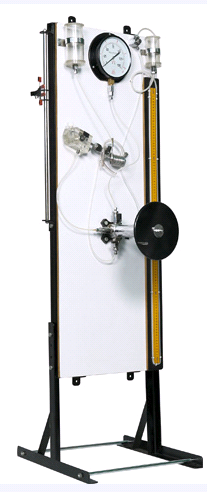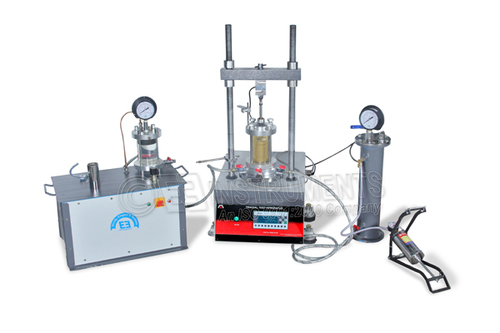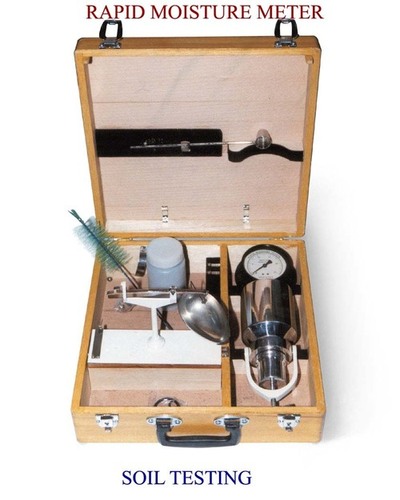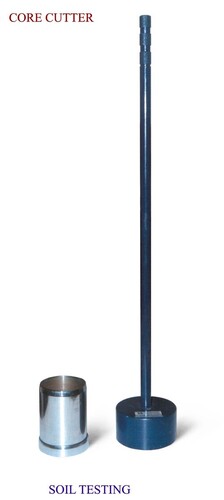Triaxial Shear Test Apparatus
Price 1.00 INR/ Piece
Triaxial Shear Test Apparatus Specification
- Hardness
- High strength steel construction
- Application
- for determining the shear strength parameters of saturated soils from triaxial compression shear tests conducted under consolidated undrained conditions with measurements of pore water pressures.
- Frequency
- 50 Hz
- Voltage
- 230 Volt (v)
- Gas Pressure
- Up to 10 bar
- Port Size
- 1/4 BSP
- Measuring Range
- 0-100% (adjustable depending on transducer type)
- Mounting Type
- Table Top
- Response Time
- <1 second
- Accuracy
- 0.5% of reading
- Automation Grade
- Semi-automatic / Fully Automatic
- Features
- Automatic data logging, graph plot, overload protection
- Specimen Size
- 38 mm, 50 mm, 75 mm diameter (standard) x 76-150 mm height
- Equipment Type
- Triaxial Shear Test Apparatus
- Product Type
- Triaxial Shear Test Apparatus
- Operating Voltage
- 230 V
- Resolution
- 0.01 kN / 0.01 mm
- Max Height
- Approximately 1000 mm
- Display Type
- Digital LCD/LED Display
- Test Range
- Up to 250 kN
- Usage
- Soil Testing Equipment
- Humidity
- Up to 95% RH
- Number of Specimens
- 1 at a time
- Power Supply
- 230 V, 50 Hz AC
- Interface Type
- USB/RS232
- Temperature
- 15 Celsius (oC)
- Capacity
- 50 kN load frame standard, other capacities optional
- Machine Weight
- Approx. 75 kg
- Test Speed
- 0.00001 to 9.99999 mm/min
- Test Stroke
- Up to 50 mm
- Control Mode
- Manual / Automatic
- Displacement Sensor
- LVDT type
- Drainage System
- Includes insulated tubing and valves
- Pore Pressure Measurement
- Digital or analog gauge
- Piston Travel
- 50 mm (standard)
- Compatible Test Types
- CU, CD, and UU triaxial tests
- Load Cell Type
- Strain-gauge based, supplied up to 50 kN
- Enclosure Protection
- IP54 rated
- De-air Burette Capacity
- 50 ml
- Software
- Windows compatible analysis software
- Transducer Output
- 0-10V analog
- Safety Features
- Emergency stop, load limit alert
- Frame Construction
- Mild steel with powder coating
- Operation Temperature Range
- 10 to 40°C
- Base Plate
- Heavy duty, corrosion resistant
Triaxial Shear Test Apparatus Trade Information
- Minimum Order Quantity
- 1 Piece
- Supply Ability
- 100 Pieces Per Month
- Delivery Time
- 4 Week
- Sample Policy
- Contact us for information regarding our sample policy
- Packaging Details
- Wooden Box / Corrugated Box
- Certifications
- ISO 9001 : 2015
About Triaxial Shear Test Apparatus
Triaxial Shear Test Apparatus Purpose: For determining the shear strength parameters of saturated soils from triaxial compression shear tests conducted under consolidated undrained conditions with measurements of pore water pressures. The Triaxial Test System provides triaxial compression tests on cylindrical undisturbed and remolded soil samples. Unconsolidated undrained UU, consolidated drained (CD) and consolidated undrained (CU) compression tests can be carried out using this apparatus. Supplied complete with Triaxial cell for 38mm dia specimen, Loading Frame 50 KN with 6 different speeds, Proving ring 2 KN with Calibration report, Dial Gauge 0.01 X 25mm travel, Bishop Pore Pressure apparatus and Air OR Water Constant Pressure system with air compressor.Further details availableon our website.
The Price mentioned here are subject to change as per the capacity,specifications and application of the user.
Advanced Measurement and Control
Equipped with a high precision strain-gauge load cell, LVDT displacement sensor, and digital/analog pore pressure measurement, this triaxial apparatus delivers accurate and repeatable data for geotechnical analysis. Its automated and manual operation modes cater to researchers diverse requirements, ensuring full control over test procedures and parameters.
Durable Build for Lasting Performance
Constructed with high-strength steel and powder-coated mild steel, the apparatus withstands demanding testing environments. Features like an IP54-rated protective enclosure, heavy-duty base plate, and high-spec insulated drainage system guarantee long operational life and minimal maintenance issues, even under intensive laboratory usage.
Flexible, User-Friendly Software Integration
The Windows-compatible analysis software allows seamless automatic data logging, graph plotting, and report generation. USB/RS232 interfaces support easy data transfer, while LCD/LED digital displays ensure users always have clear, actionable information throughout every test cycle.
FAQs of Triaxial Shear Test Apparatus:
Q: How does the Triaxial Shear Test Apparatus determine soil shear strength?
A: It measures the response of a saturated soil specimen under controlled triaxial compression, recording axial load, displacement, and pore pressure to determine key shear strength parameters using strain-gauge load cell and LVDT sensors.Q: What types of triaxial tests can be performed with this apparatus?
A: The equipment is compatible with consolidated undrained (CU), consolidated drained (CD), and unconsolidated undrained (UU) triaxial test procedures, supporting a wide range of geotechnical investigations.Q: When should I use the different pore pressure gauge options?
A: Choose the digital gauge for enhanced accuracy and ease of monitoring, or select the analog gauge for simple, direct readings, depending on project requirements and laboratory preferences.Q: Where is this apparatus best utilized?
A: It is best suited for geotechnical, civil engineering, and research laboratories engaged in soil analysis, particularly where rigorous and repeatable triaxial shear testing of saturated soils is needed.Q: What is the process of data logging and analysis in this device?
A: Automatic data logging is available via integrated software, which records, analyzes, and graphs key test parameters in real time. Results can be exported to a PC using USB or RS232 interfaces for further reporting.Q: How does the safety system work on this apparatus?
A: The device includes an emergency stop and load limit alerts to ensure user and equipment safety, automatically stopping hydraulic action or triggering alerts when set thresholds are exceeded.Q: What are the benefits of the devices enclosure and frame design?
A: With an IP54-rated mild steel enclosure and heavy-duty, corrosion-resistant construction, this apparatus is highly resistant to dust, water splashes, and mechanical stress, ensuring consistent performance and longevity in laboratory settings.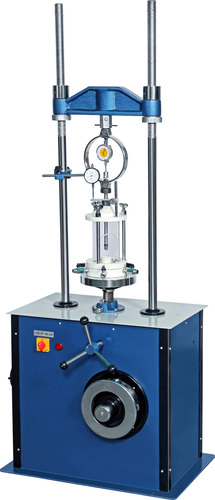
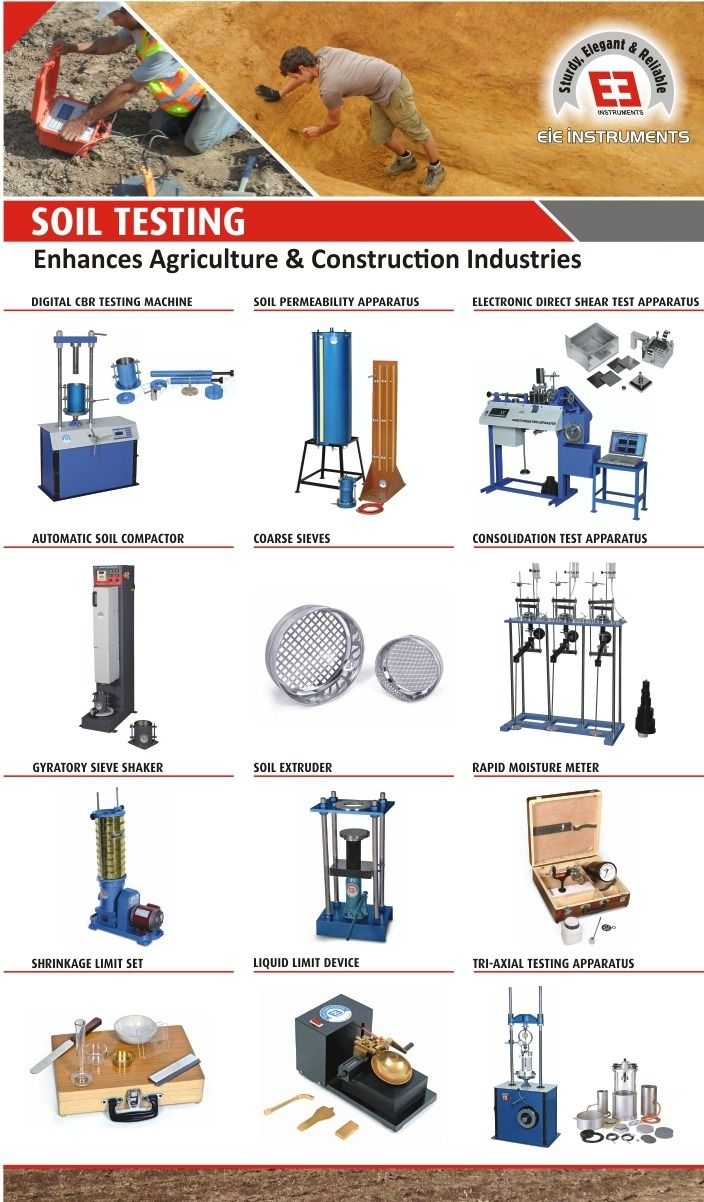

Price:
- 50
- 100
- 200
- 250
- 500
- 1000+
More Products in Soil Testing Equipments Category
Bishop Pore Pressure Apparatus
Price 1.00 INR / Piece
Minimum Order Quantity : 1 , , Piece
Automation Grade : Manual
Usage : Geotechnical laboratory, civil engineering soil testing
Features : Anticorrosive construction, chemical resistance, easy maintenance
Machine Weight : Approx. 17 kg
Digital Triaxial Shear Test Apparatus
Price 1.00 INR / Piece
Minimum Order Quantity : 1 Piece
Automation Grade : Automatic
Usage : Laboratory
Features : Touchscreen control, programmable test parameters, data storage, overload protection
Machine Weight : 110 kg
Rapid Moisture Meter
Price 1.00 INR / Piece
Minimum Order Quantity : 1 Piece
Automation Grade : Manual
Usage : Soil Testing Equipment
Features : Portable, easy to use, no electricity required
Machine Weight : Approx. 2 kg
Field Density Test Apparatus - App Core Cutter Method
Price 1.00 INR / Piece
Minimum Order Quantity : 1 Piece
Automation Grade : Manual
Usage : Soil Testing Equipment
Features : Robust Construction, Stainless Steel Cutter, Easy to Use
Machine Weight : 11.2 Kilograms (kg)
 |
EIE INSTRUMENTS PVT. LTD.
All Rights Reserved.(Terms of Use) Developed and Managed by Infocom Network Private Limited. |

 Send Inquiry
Send Inquiry
